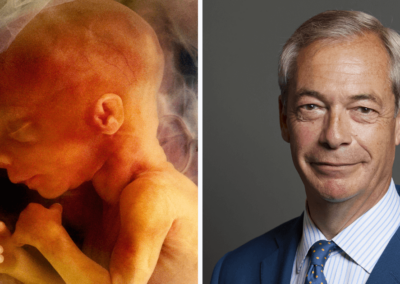As Nigel Farage returns to frontline politics, what will this mean for the abortion debate?
Yesterday afternoon, Nigel Farage, founder of Reform UK (previously the Brexit Party) and former Member of the European Parliament, announced that he would be taking over the leadership of the Reform UK party from Richard Tice.
He also announced that he would be leading Reform UK for the next five years and that he would be standing in the General Election as a candidate inr the constituency of Clacton in Essex.
While this announcement is likely to cause a certain amount of political uncertainty, the effect this will have on the pro-life cause is even less clear.
What are Nigel Farage’s views on life issues?
Nigel Farage has consistently refused to take a side on life issues and his party appears to be doing the same.
In a discussion on the state of abortion law and the upcoming election in the United States, Nigel Farage said “I genuinely think this should be an issue of conscience”.
He also referred to the pro-life position as a “minority view” and said that pro-life legislation in Arizona is a “major problem for Trump and his campaign”.
In 2019, as leader of the Brexit Party, of which he said Reform UK is a ‘direct descendent’, Farage said the party did not have a position on abortion and refused to condemn Ann Widdecombe for her pro-life views.
What are Reform UK’s policies on life issues?
Reform UK does not have any official policies on abortion or assisted suicide. Such issues are traditionally considered ‘conscience’ issues on which MPs are typically given a ‘free vote’, rather than having to vote along political lines.
However, although life issues are generally considered conscience votes, in the 2019 General Election, both the Liberal Democrats and the Labour Party pledged to make extreme changes to our abortion law. The Liberal Democrats committed themselves to removing almost all safeguards surrounding abortion before 24 weeks, whereas Labour pledged to make abortion legal up until birth.
Furthermore, the leader of the Labour Party and possible future Prime Minister, Sir Keir Starmer, has not only voted in favour of making assisted suicide legal in the past, but also publicly stated his continued support for it and even pledged that he will make time for a vote on the matter should he become PM.
While Reform UK have not made any pledges or comments on either of these issues, Ann Widdecombe, who has a strong pro-life record, is the party’s Justice and Immigration spokesperson, while their Chairman and former leader, Richard Tice, who is also the party’s candidate in Boston and Skegness, has previously expressed concerns about pro-life volunteers being arrested for praying silently near abortion clinics.
In addition, journalist and political commentator Isabel Oakeshott, who is the partner of Richard Tice and a prominent supporter of the party, recently wrote about her opposition to the decriminalisation of abortion.
Reform UK’s only MP before the dissolution of Parliament was Lee Anderson, who, while not having a consistently pro-life voting record, was one of 52 MPs who signed Flick Drummond’s recent amendment to the Criminal Justice Bill that would have reinstated in-person appointments before women could take abortion pills at home.
He had previously voted against pills by post being made permanent. However, Lee Anderson has a mixed record on buffer zones, voting against an attempt to introduce them in 2020 but then voting in favour of an amendment to the Public Order Bill in October 2022 mandating national buffer zones around abortion clinics. In 2023, he supported Andrew Lewer MP’s unsuccessful attempt to explicitly permit silent prayer to be permitted within buffer zones.
What does this mean in the context of the General Election?
A large majority of MPs from the last Parliament with a strong pro-life voting record were Conservative MPs.
With Reform UK contesting the election in 630 out of 650 seats, it is possible that Conservative pro-life MPs from the last parliament, who are standing as candidates in this election, will see more of their vote share moving to Reform UK putting these pro-life MPs at more risk of losing their seats. This may happen if the return of Nigel Farage results in increased numbers of people voting for Reform UK candidates rather than Conservative candidates.
MPs from the last Parliament with a strong pro-life voting record who are standing for other parties are less likely to be impacted by any uplift for Reform UK resulting from the return of Nigel Farage as party leader, although some Labour votes are also likely to go to Reform UK.











